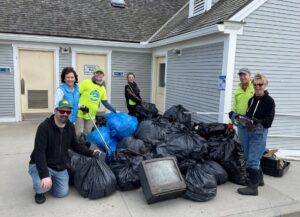 HYANNIS -Everyone has moments of forgetfulness, especially as they age. Losing car keys, forgetting what you need to buy at the grocery store or where you parked your car can all be jokingly attributed to “senior moments.” For most people that would be the right analogy.
HYANNIS -Everyone has moments of forgetfulness, especially as they age. Losing car keys, forgetting what you need to buy at the grocery store or where you parked your car can all be jokingly attributed to “senior moments.” For most people that would be the right analogy.
“Short-term memory is often the first thing to go with age,” explained Hyannis neurologist Karen Lynch, MD, adding that it sometimes is particularly true of women because they are often more apt to be distracted or thinking about multiple things at the same time. This in turn interferes with their ability to retain memories. As we age, the amount of time our memory can store short-term memories becomes shorter and shorter, she said.
For others, however, memory lapses are a foreshadowing of more serious cognitive decline. A recent study, published by the journal Neurology, involved 1,107 women age 65 and older. At the beginning of the study, about 8 percent of the women reported having memory lapses.
Nearly 20 years later 52.8 percent of that subgroup of 89 patients had suffered significant cognitive decline, compared to 38 percent of the people who didn’t report memory lapses at the beginning of the study.
The fact that it took close to two decades to see those results means that most people don’t have to worry, according to Dr. Lynch. When a patient comes in with subjective complaints of forgetfulness, she may run some tests, and sees them again in six months or a year, and sometimes annually, depending on the concerns. If everything is stable, she leaves the door open for them to come back if their symptoms worsen, but often continued close neurological care isn’t necessary.
“When a patient comes in and tells me they’re worried that they have Alzheimer’s disease, the vast majority of the time I can usually say that they don’t,” she said. “Most people with Alzheimer’s never realize their cognitive failings, and have little insight into the memory loss. They can go many years not really aware that they are having difficulties. It’s usually a family member or friend who brings them to the attention of the physician. If somebody, themselves, admits that they are having memory issues, most likely it may simply be normal aging.”
It’s Different If You’re Younger
The exception to that is someone who is in their 40s through early 60s. People who are still working are more apt to notice cognitive decline because they have trouble doing their job. They also tend to be more active than most retired people and, as such, cognitive decline and the associated withdrawal from normal activities can be more obvious and picked up sooner.
Orientation is another big clue, Dr. Lynch said. Frequently, not knowing where you are or the month and year can be signs of Alzheimer’s.
It’s the difference between not being able to find your car keys and not remembering that you own a car. People experiencing senior moments are still able to function in life. When memory starts to interfere with that, it is a sign something is going wrong, she said.
“It can be hard to figure out, so if you are worried you should talk to your primary care doctor,” Dr. Lynch said. “If your physician evaluates you and thinks there might be something more to it, then certainly it is best to have it checked out. Sometimes that reassurance is all you need.”
Certain people are harder to diagnose than others, but researchers are now in the process of using imaging to diagnose Alzheimer’s disease. Dr. Lynch is participating in a $100 million nationwide study called Imaging Dementia – Evidence for Amyloid Scanning (IDEAS). The study is supported by the Alzheimer’s Association and is funded largely by Medicare.
The study began in 2015 and is expected to recruit up to 18,000 participants. To qualify for the study, a patient must be 65 or older, Medicare eligible and showing mild signs of dementia where the cause is unclear. Participants are given a PET scan that can reveal clumps of amyloid, a malformed protein found in the brain of people with Alzheimer’s disease.
To Help the Caregiver
“Even though there is currently no cure for Alzheimer’s disease, there are medications that can help slow the progression of the disease,” Dr. Lynch said. A large part of the reasoning behind the study is that the Alzheimer’s Association believes that diagnoses help caregivers cope and plan.
“Having the label and knowing where things are going can open up families, as there is a lot of denial about these conditions,” she said. “Trial organizers are hoping the scans will lead to fewer hospitalizations as the new diagnoses make families more vigilant. For example, dementia patients often wind up sick because they get confused about medications for heart problems or diabetes.”
Dr. Lynch expects to refer about 200 patients to the study and is very careful about choosing candidates. Someone who has obvious signs of Alzheimer’s or advanced dementia would not be appropriate for the study. Very elderly people wouldn’t be either.
She is often reserving her slots for younger patients who have mild symptoms on occasion, and/or those who are difficult to diagnose. For example, differentiating different dementing illnesses, and teasing out concerns in those with underlying psychiatric or intellectual disabilities where routine investigations cannot give a definitive diagnosis.
“It’s a good study to be part of because this will probably eventually be the imaging for Alzheimer’s down the road,” she said. “A lot of the push in research of medications for Alzheimer’s is looking at amyloid proteins specifically and getting rid of those proteins as a treatment path. So if we can identify it, that’s a big step forward.”























